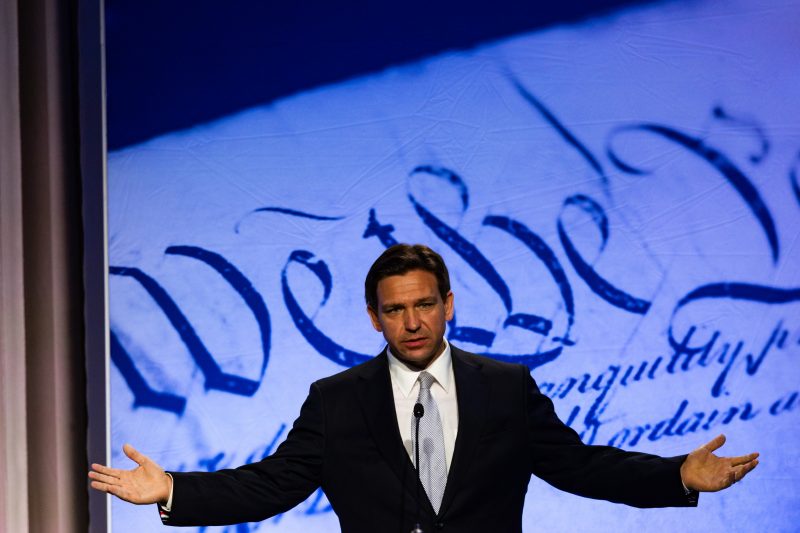Maybe the outcome of the Republican presidential nominating contest is a foregone conclusion. Maybe Donald Trump truly is unbeatable. Maybe Ron DeSantis really has squandered the chance to topple him. But with more than six months before the first primary votes are cast, keeping an open mind isn’t a bad idea. The story of Barack Obama tells us that much.
Campaign analogies are imperfect, but at the start of this year, the 2024 Republican race loosely resembled the Democratic nominating contest in 2008. When that campaign took shape in early 2007, Hillary Clinton was the clear favorite, Obama was a rising star and the rest of the field was struggling to gain traction. This year, Trump, as a former president, entered with the most support by far. DeSantis, the Florida governor, began as the hot newcomer, and the nine other Republican candidates were (and are) looking for an opening.
At the start in 2007, Clinton carried the best brand in the Democratic Party. Plus, she had national experience through eight years as first lady and half a dozen as a U.S. senator from New York. She also had vulnerabilities. One was her vote for the resolution that authorized the Iraq War, highly unpopular with the left. Another was the perception of her as a chilly, calculating politician.
Obama, though popular thanks to his soaring rhetoric and charisma, was thin on experience, untested nationally and, no small thing, was Black. The rest of the Democratic field included a onetime vice-presidential candidate (John Edwards), a well-regarded senator (Chris Dodd), a former ambassador to the United Nations and sitting governor (Bill Richardson) and a prominent senator who had run for president once before (Joe Biden). Despite those other candidates’ good résumés, most attention was focused on Clinton and Obama.
Compare that with the current Republican contest. Trump is certainly dominant but also has vulnerabilities. For many Republicans, he is a politician with deep character flaws who lacks seriousness as a leader, who has promulgated lies about the 2020 election and has a vindictive streak. Those Republicans want their party to move on from the Trump era.
Trump has been indicted in two criminal cases — a state case in New York for allegedly falsifying business records and a federal case by the Justice Department for allegedly mishandling classified documents. In addition, special counsel Jack Smith is investigating Trump’s role in the Jan. 6, 2021, attack on the U.S. Capitol. And in Georgia, Fulton County District Attorney Fani T. Willis is looking at Trump’s involvement in efforts to reverse the result of the presidential election in that state.
DeSantis’s big reelection victory in a big state in November elevated his standing, although, as Obama did, DeSantis has entered the presidential race untested on the national stage. The rest of the field includes a former vice president and ex-governor (Mike Pence), a former ambassador to the United Nations and ex-governor (Nikki Haley), a well-regarded U.S. senator (Tim Scott), a sharp-tongued former governor (Chris Christie), and others.
Obama’s early going was plagued by problems and frustrations. As his chief strategist David Axelrod said later, “Basically he had leaped into the deep end of a very cold pool, and I think it was a shock to the system.” Obama didn’t have the luxury of finding his footing slightly out of the public eye. Every mistake was magnified because he was, as he would later put it, starting under the bright lights of Broadway. DeSantis can identify with that.
By summer 2007, Obama was on the defensive. He had opened himself to criticism in the area of foreign policy. Asked at an early debate to name the first things he would do to respond to a terrorist attack, he offered a passionless legal checklist. Clinton, who had styled herself in the Senate as a hawk, said she would go after the perpetrators. In a major speech, Obama declared that he would not hesitate as president to send troops into Pakistan to pursue identified terrorists, even without Pakistani consent. His rivals piled on, calling him naive and reckless.
Obama found the pace of a national campaign exhausting. He bristled at some of the smaller but necessary demands of the caucus process in Iowa. Early on, he found little positive reinforcement from being a candidate. After a fundraiser in the summer of 2007, he and a few of his top advisers got together for a late dinner. Obama sensed what was coming. “Okay,” he said, “is this where we have an intervention?”
Problems persisted. At a meeting in October 2007 with nervous campaign donors, Obama offered reassurance. “I know it’s much bumpier than you thought it would be, but I’ll hold your hand and we’ll get through this,” he told them.
Everyone knows the end of the story. Clinton hit a serious speed bump at a debate that fall that opened her up to real criticism from the others. Obama found his voice at the right moment and scored a big victory in the first test in Iowa. After an epic contest that went on for months, the rookie candidate who had struggled for months prevailed.
That history is a reminder that nominating campaigns are organic and dynamic, that some candidates learn and grow but that others do not, that the unexpected is to be expected. Rarely is there a straight line in the unfolding drama. Perhaps this time there will be no way around Trump, no matter how skillful his opposition. That is the challenge ahead for DeSantis and others.
Although there are similarities in the way their candidacies took shape, DeSantis is no Obama. Obama had a positive message, an appeal to better angels (that he was never able fully to achieve in office). DeSantis’s message is the opposite, an appeal with edge and grievance, a call to defeat everything “woke” (although the concept is ill-defined), a pledge to dismantle the federal bureaucracy. This is partly an echo of Trump, and DeSantis is betting that Republican voters want to hear it.
Through difficult times, Obama was sustained by the prodigious amounts of money he raised, mainly through grass-roots support. What he lacked in candidate effectiveness in those months was offset by headlines about fundraising success that underscored his appeal.
Here, too, is a parallel to DeSantis, who has long had considerable fundraising prowess. He has placed significant hope in the work of a well-financed super PAC called Never Back Down, which is doing many of the things that a traditional campaign does. DeSantis is raising money for his campaign as well. Second-quarter fundraising reports will come out relatively soon, and this will show how much grass-roots money has come his way.
Obama also was comforted by the disconnection between national and state polling. In that campaign, national polls tended to show Clinton with a clear lead. But in state polls, a different pattern emerged. For most of 2007, she, Obama and Edwards were within seven percentage points of one another in Iowa, according to polling by J. Ann Selzer for the Des Moines Register. By the eve of the caucuses, Obama had a narrow lead, foreshadowing his breakthrough victory.
DeSantis cannot make a similar claim about state vs. national polls. Trump dominates national polls, and that lead has grown in the face of two indictments. But he also leads in states with early contests, in some cases, significantly. An exception emerged Wednesday, in a poll from Marquette University Law School that showed Trump and DeSantis running close to each other in Wisconsin. DeSantis needs more of those indicators.
Debates started early in 2007 among the Democrats. This year, Republicans will not debate until Aug. 23, and Trump’s participation is in question. His absence would deprive DeSantis and the other aspirants of the opportunity to challenge Trump face-to-face. The GOP race remains relatively static and could stay that way until after Labor Day and even beyond.
Obama benefited from two factors: a Clinton mistake in a high-profile setting in the fall of 2007 and his steadily improving skills as a candidate. Not much has ever seemed to dent Trump’s appeal with the GOP base, which puts even more pressure on DeSantis to step up, lest Trump run away with the nomination or someone else fill the role the Florida governor had been expecting to play.








